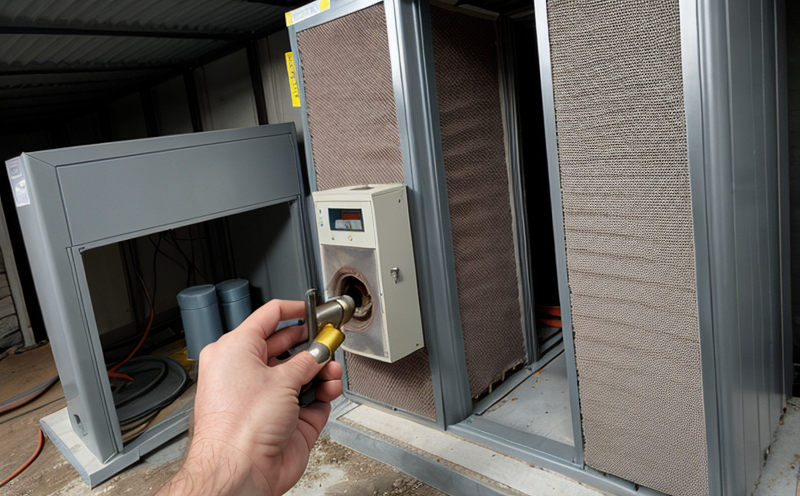Durability testing of insulation performance after laundering
The durability testing of insulation performance after laundering is crucial in ensuring that textile products maintain their thermal and insulating properties throughout their lifecycle. This test plays a pivotal role in validating the quality and reliability of insulation materials used in various sectors, including construction, automotive, and textiles. The process involves subjecting the material to repeated cycles of washing and drying to simulate real-world use conditions.
During this testing, samples are prepared according to specific standards such as ISO 16929 for nonwovens or ASTM D5453 for fabrics. Specimens are subjected to a series of wash cycles using industrial laundry machines, followed by drying processes that simulate domestic and commercial washing conditions. The test parameters can vary based on the material type and its intended use in different sectors.
After each cycle, the insulation performance is measured using instruments like calorimeters or thermal scanners. The data collected helps assess whether the insulation properties have been maintained post-laundering. This information is vital for manufacturers to ensure their products meet regulatory requirements and customer expectations.
The results of these tests are often compared against baseline measurements taken before laundering. Any significant deviations from expected performance levels can indicate potential issues with the material or manufacturing process. By conducting such durability testing, companies can identify areas for improvement early in development stages, ensuring higher-quality final products that perform consistently under various environmental conditions.
Quality managers and compliance officers benefit greatly from this service as it provides them with objective evidence supporting claims about product performance and durability. R&D engineers gain insights into how different variables affect material behavior during washing cycles. Procurement teams can use these findings to make informed decisions regarding supplier selection and contract negotiations.
In summary, durability testing of insulation performance after laundering ensures that manufacturers deliver reliable products capable of maintaining optimal thermal insulation capabilities even after multiple washings. It supports compliance with industry standards while enhancing customer satisfaction through consistent product quality.
Why Choose This Test
Selecting this type of durability testing is essential for several reasons:
It helps ensure that insulation materials continue to function effectively despite repeated washings, which is critical in sectors like construction and automotive where textiles are frequently exposed to moisture.
The test provides valuable data on the longevity of the material, allowing manufacturers to optimize production processes for better results.
Compliance with relevant international standards such as ISO 16929 or ASTM D5453 is easier when regular durability testing is performed.
Durability testing enhances brand reputation by delivering products that consistently meet high quality expectations.
For quality managers and compliance officers, choosing this test ensures they have accurate data to support their decision-making processes. R&D engineers can use the insights gained from these tests to innovate new materials or improve existing ones. For procurement teams, selecting suppliers based on successful completion of such tests increases confidence in long-term partnerships.
Quality and Reliability Assurance
The importance of ensuring quality and reliability cannot be overstated when it comes to textile products that rely heavily on their thermal insulation properties. This section will outline key aspects related to quality assurance measures implemented during durability testing:
Sample preparation adheres strictly to specified standards, ensuring consistency across all tests.
The use of controlled environmental conditions replicates realistic washing and drying scenarios experienced by end-users.
Instruments employed for measurement are calibrated regularly according to manufacturer guidelines to maintain accuracy.
Data analysis incorporates statistical methods to identify trends and patterns that could indicate material degradation over time.
By focusing on these areas, laboratories strive to deliver accurate, reliable results that provide confidence in the performance of tested materials. These efforts contribute significantly towards maintaining industry standards and fostering trust among clients.
Competitive Advantage and Market Impact
Durability testing of insulation performance after laundering offers numerous competitive advantages:
Innovation Leadership: By staying ahead of market trends through rigorous durability testing, companies can introduce more robust products that outperform competitors.
Better Customer Satisfaction: Consistently delivering high-quality products enhances customer loyalty and satisfaction, leading to repeat business opportunities.
Regulatory Compliance: Meeting or exceeding regulatory requirements not only avoids legal penalties but also strengthens brand reputation among consumers who value safety standards.
Innovation Opportunities: Insights gained from durability testing can lead to breakthroughs in material science, opening up new markets and applications for textile manufacturers.
Achieving these benefits requires a commitment to continuous improvement within the organization. Laboratories play an integral role by providing accurate data that supports informed business decisions at every level of operation.





